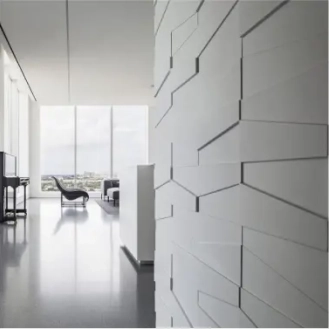Applying Fire Rated Intumescent Paint on Steel
Steel is a popular construction material, being appreciated by constructors for its resistance and versatility. Steel is also a noncombustible material and, as such, properly constructed steel structures can preserve their integrity during prolonged elevated temperatures. Some steel-based structures such as low-rise buildings do not require fire protection or only require sprinkler systems.
Despite being the strongest metal used in construction, there are circumstances where steel can lose its capacity to handle heavy loads only a few minutes after being exposed to severe heat if it is left unprotected. Building codes take into consideration several cases where this can be the case and some steel-based construction structures require passive fire protection.
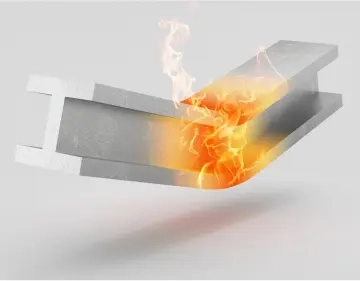
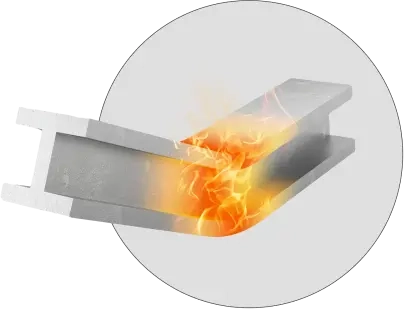
When passive fire protection is required and flexibility and aesthetics are important, constructors can consider reducing the risks of a structural collapse in the eventuality of fire by applying intumescent coatings on the steel structures in question. Intumescent products can also be used to upgrade the fire rating of a steel structure that is already protected, for example from 1 hour- to 2 hour- fire rating.
There are two different types of fire resistant paint that can be used for steel: fire-retardant and intumescent. Fire retardant paint responds to heat with flame-damping gas that limits the spread of flames across a surface. Flame retardant paint is not used on steel structure as often as intumescent paint because it has limited insulating properties.
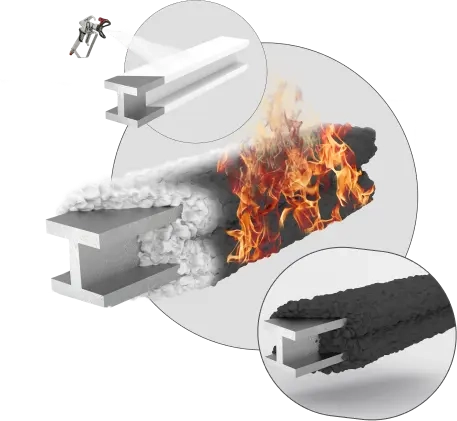
Fire rated intumescent paint is the most commonly used coating to protect steel against fire and acts as an insulator, forming a solid char in response to heat. Intumescent paint can be applied on steel as a thin or a thick film coating. Thin film fireproof paint materials that can be used for steel are water or solved based and are typically applied to prevent fires in regular buildings. While thick films were originally used in hydrocarbon and off-shore industries, a modified version of them is currently used for fire prevention in buildings. As their name suggests, thick films have a higher thickness and are useful in places where thin films may not work, with a good example being the external steel structures from skyscrapers.

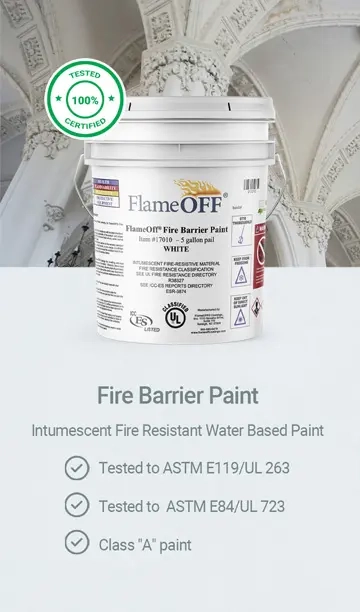
Try the FlameOFF Coatings steel calculator to get an idea of the approximate amount of product needed for your projects. It is the guide you need to minimize the guesswork in your projects.
Steel Coverage CalculatorOur intumescent paint can be applied on steel with a brush or spray with an application rate per coat of 1138.8 sq ft/gallon at 1 mil and 37 sq ft/gallon at 30 mils
Technical Data
FlameOFF® intumescent coatings provide the installer an easier application of the intumescent coating and offer design professionals many benefits.
Listings
The performance criteria as set out in a building code are clear and unambiguous, and need to be tested by an independent third party. Our tests are completed by national accredited testing laboratories. Their unbiased results are the basis for our certification listings.
FlameOFF® Fire Barrier Paint has been tested to ASTM E119/UL 263 and ASTM E84/UL 723 Fire Endurance standards to meet the requirements set forth by IBC/NFPA Building Codes. Our product is ICC Listed and UL Classified and can be found in the ICC Listing Directory and UL Product iQ, and below. Please contact FlameOFF® Coatings Technical Team to receive individual test reports conducted to ASTM E119/UL 263 and ASTM E84/UL 723 test standards for all substrates.
| Program | Standard | Details | Record | Design/Listing |
|---|---|---|---|---|
| ASTM E119 UL 263 CAN ULC-S101 | Wide Flange and Hollow Steel Sections Gypsum | ESR-3874 | ESL-1191 | |
| ASTM E84 UL 723 CAN ULC-S102 | Gypsum Wood | ESL-1192 | ||
| UL 263 CAN ULC-S101 | Wide Flange and Hollow Steel Sections Gypsum | CDWZ.R38327 CDWZ7.R38327 | BXUV.N56 BXUV.Y658 BXUV.W310 | |
| UL 2818 | Emissions Testing | 339065-420 |
Applying FlameOFF® Fire Barrier paint on exposed structural steel elements can provide additional fire-resistance, increasing the hour fire rating of an element while also improving the aesthetics of the structure in question.
The product must be applied to the steel in layers to achieve the required DFT for the appropriate rating as specified by building codes.
The intumescent paint can be topcoated with latex or acrylic paints in order to obtain a specific color.
When applied on steel, our intumescent fire barrier paint product provides a thin film finish while protecting the steel elements from catastrophic building fires.
COMMERCIAL
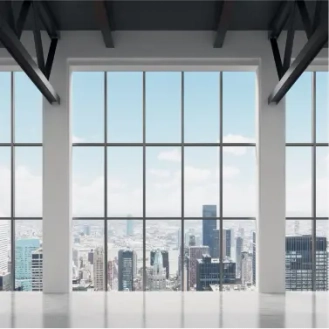
INDUSTRIAL

RESIDENTAL
